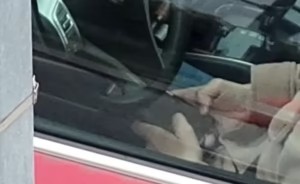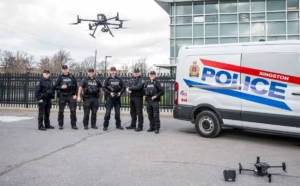On May 7, 2025, Kingston Police conducted a distracted driving enforcement operation using drone technology, issuing 20 tickets for drivers using handheld devices. This initiative, while aimed at enhancing road safety, has sparked significant debate over privacy rights and the constitutionality of such surveillance methods.

Kingston Police Say The Images Captured By The Drone, Like This One, Are Essentially The Same As Evidence Gathered Through Other Methods Used To Catch Distracted Drivers. (Supplied By Kingston Police)
The integration of drone technology into law enforcement practices has introduced new dimensions to public safety and surveillance. While these tools offer innovative ways to enforce laws, they also raise critical questions about privacy and constitutional rights. The recent use of drones by Kingston Police to monitor and ticket distracted drivers exemplifies this tension.
The Enforcement Operation
On May 7, 2025, Kingston Police deployed a DJI Matrice 300 drone to monitor drivers at three major intersections: Division Street at John Counter Boulevard, Sir John A. Macdonald Boulevard at John Counter Boulevard, and Highway 15 at Gore Road. The drone’s zoom camera captured video evidence of drivers using handheld devices, leading to 20 tickets issued for distracted driving offenses. This marked the first time the department utilized drone technology for such enforcement. Facebook+2Kingston Police+2Facebook+2
Legal and Privacy Concerns
The operation has drawn criticism from legal experts and privacy advocates. Dominic Naimool, a local lawyer, expressed concerns about the invasion of privacy, stating that such surveillance methods could be unconstitutional. The Canadian Constitution Foundation (CCF) echoed these sentiments, arguing that the practice violates Section 8 of the Canadian Charter of Rights and Freedoms, which protects against unreasonable search and seizure. junonews.com
Josh Dehaas, a constitutional lawyer with the CCF, emphasized that Canadians have a reasonable expectation of privacy in their vehicles. He warned that the use of drones for surveillance without a warrant sets a concerning precedent. TPR Hamilton
Police Response
Kingston Police Chief Scott Fraser defended the operation, stating that the drone’s use is an extension of traditional surveillance methods, such as officers observing from elevated positions. He argued that the drone did not capture any information that couldn’t be obtained through other means and that the intent was solely to enforce distracted driving laws.

Broader Implications
The controversy highlights the broader debate over the use of surveillance technology by law enforcement. While drones can enhance public safety efforts, their deployment raises questions about the balance between security and individual privacy rights. Former Ontario Privacy Commissioner Ann Cavoukian criticized the practice, describing it as “absurd” and more intrusive than other enforcement tools like red light cameras.
Legal Precedents
The legal debate centers on interpretations of Section 8 of the Charter. In the case of R v. Jarvis (2019), the Supreme Court of Canada ruled that individuals have a reasonable expectation of privacy in public spaces, depending on the context. This precedent may influence how courts view the use of drones for surveillance without warrants. TPR Hamilton
Public Reaction
Public opinion is divided. Some residents appreciate the innovative approach to curbing distracted driving, while others find the surveillance “creepy” and invasive. The debate continues to unfold on social media and in community discussions.
Conclusion
The use of drones by Kingston Police to enforce distracted driving laws has ignited a complex debate over privacy, legality, and the role of technology in law enforcement. As the situation develops, it may set significant precedents for how surveillance tools are integrated into policing practices across Canada.
📌 Sources
-
Kingston Police Traffic Safety Unit incorporates drone technology to address distracted driving. (2025). Retrieved from Kingston PoliceFacebook+2Kingston Police+2Facebook+2
-
Drone Surveillance of Drivers “Clearly Unconstitutional,” Says CCF. (2025). Retrieved from Canadian Constitution FoundationCanadian Constitution Foundation+3Canadian Constitution Foundation+3Canadian Constitution Foundation+3
-
Kingston Police’s use of a drone to catch distracted drivers stirs backlash. (2025). Retrieved from Yahoo NewsYahoo News+1LinkedIn+1
-
Joey’s Notepad: Civil Liberties and Police Drones Looking Into Vehicles. (2025). Retrieved from The Public RecordTPR Hamilton
-
Privacy and Drones: Unmanned Aerial Vehicles. (2012). Retrieved from Information and Privacy Commissioner of OntarioX (formerly Twitter)+5IPC Ontario+5Surveillance Studies Centre+5

